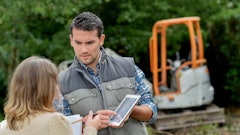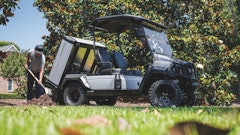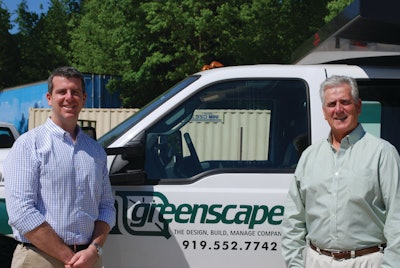
Daniel Currin was vice president of sales at his father's landscaping firm, Greenscape Inc. in Holly Springs, NC, when the recession flipped the company on its head in 2008. To compound the urgency of the situation, Daniel was evolving into the role of president, and was poised to begin taking the company reigns from his dad. Daniel and his new executive team had to find their focus—and the company's—fast.
"The business had to shift, and my dad's legacy of high-dollar design/build projects had to change," Daniel says. "Demand for landscaping services was still there, but we had to adjust to new pricing requirements while reallocating resources to grow different parts of our business."
Greenscape has done it. They're back on a sales-growth footing and feel good about where things are headed. The country is no longer on the "real estate standard," as Daniel likes to put it, which means consumers aren't blindly dumping tons of money into new landscaping projects via home equity lines. But the Raleigh-area economy is strengthening and the stock market is back. Daniel says niche design/build work is still available if you know where to look, and opportunities to grow in both maintenance and lawn care are abundant.
Recognize what the market needs
Daniel says demand for design/build tanked in 2008. "Demand shrank and the market only needed seven or eight contractors as opposed to 10. But all 10 stayed and said they'd do the work for a lower price. So we've had to adjust our business to this new level of pricing.
"The good news is that some clients who'd opted for a lower-priced contractor are now saying they want quality and service back," Daniel continues. "They're also getting some of their budgets back, so they're willing to pay a little bit more. I'd put it this way: If we were charging $10 in 2007, we're now back to being able to charge $8 or $9 on a pretty consistent basis."
Greenscape has seen a significant shift in its sales mix over the past five years as well. Just look at this 2008-2013 (projected) trend line:
- Design/build – down 47%
- Subcontractors – down 30%
- Maintenance – up 60%
- Enhancement – up 36%
- Irrigation Service – up 55%
- Lawn Care (Weed Man franchise) – up more than 300%
Greenscape's overall 2013 sales are forecasted to be up 37% compared to 2008. As you can see, the big growth is happening in service-related segments of the business. That's not to say that design/build is no longer important. In fact, the company is doing around $2.25 million a year in design/build. But nearly half of that is now driven by maintenance-related enhancement projects.
New model of doing business
That's where the biggest shift has taken place, Daniel relates. The old model of doing business has been replaced by a new one:
- Old Model – secure as much design/build work as possible almost entirely through word of mouth; you can then pursue maintenance contracts with some of those same properties if you're interested
- New Model – secure as much maintenance-related work as possible through aggressive sales/marketing programs; generate smaller design/build contracts (enhancements) by staying ultra-close to existing maintenance clients.
"We've always been a design/build/maintenance company," Daniel points out. "We still are, only the flow is different. Commercial landscape maintenance and lawn care are the drivers now."
Greenscape began the three-year process of re-circulating this flow in 2009. They moved their top-performing residential d/b salesman, Greg Smith, into commercial maintenance. That required some additional training to better familiarize Smith with the maintenance side of the business.
Like any good salesperson, Smith then took steps to forge his own success. He leveraged his existing relationships with real estate agents, builders and remodelers in the residential arena to help establish connections with their clients on the commercial property management side.
"As a company, we just needed to make sure that Smith knew we had his back when he found a potential opportunity," Daniel says. "Now his sales level is right back to where it was in 2007. It has been a great success story."
Smith's success and expertise selling residential d/b services actually gives him an advantage in commercial maintenance, Daniel points out. "Most maintenance clients, at some point, need some kind of design/build services," Daniel says. "It might be plants that need to be replaced, drainage or an irrigation retrofit, or whatever." When it comes to providing superior service to maintenance clients, the manner in which these types of problems are addressed can make all the difference.
One other thing Greenscape did when shifting business models was downsize some of its crews. "We took several of our four-man design/build crews and created two-man enhancement crews," Daniel tells. This made sense simply due to the smaller-scope projects Greenscape was now doing. "We then outfitted the crews with smaller equipment such as Ditch Witch mini stand-on skid-steers. We also gave crew leaders more responsibility to 'own' each job since these smaller projects didn't allow for as much oversight from a production manager."
Aggressive growth in lawn care
Perhaps more impressive than Greenscape's business-model shift has been its growth in lawn care. The company has been a Weed Man franchisee since 2005. The original location at the company headquarters in Holly Springs has grown 192% since 2008, while the brand-new location in Wilmington is expected to do $850,000 this year. That spells a whopping 300%-plus growth rate over the past five years.
"Our market in general has cut back a bit on lawn care services," Daniel says. "But the market is still very large. Since we're relatively new in it, we have a small piece of the market share. So we see a lot of room to grow, and lawn care has become a growth focus for us."
Daniel points to two things that have helped to acquire market share:
Aggressive goals. Daniel says his team would not accept the effects of the recession. "We set big goals, which we didn’t always hit, but they kept us moving forward," he says.
Aggressive customer acquisition process. Greenscape's design/build model had largely been about word-of-mouth and referrals. "We needed to get more proactive about acquiring new customers in lawn care," Daniel says.
Neighborhood marketing and good old-fashioned door knocking became key. "We were one of the only lawn care companies in our market that was doing this," Daniel says. "It's not glamorous, but it works if managed correctly with a good sales process on the back end to follow up on leads and generate quotes."
Greenscape/Weed Man's new Wilmington branch has also breached the 1,500-customer mark. Daniel expects to topple the million-dollar market in the next couple of years. In the meantime, Holly Springs (Raleigh) continues to grow as well, now eclipsing the 4,000-customer mark.



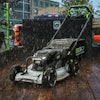
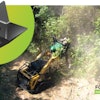
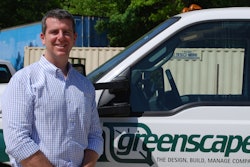
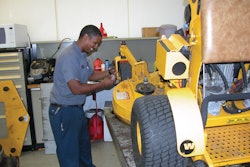
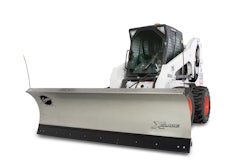








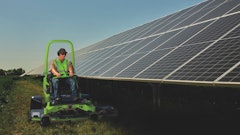
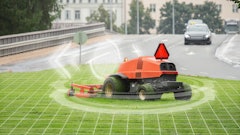
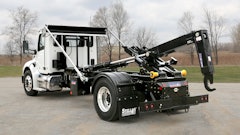
![Gravely Pro Turn Mach One My23 Dsc03139 Edit 1200x800 5b2df79[1]](https://img.greenindustrypros.com/mindful/acbm/workspaces/default/uploads/2025/10/gravely-pro-turn-mach-one-my23-dsc03139-edit-1200x800-5b2df791.BucBnDoN22.jpg?ar=16%3A9&auto=format%2Ccompress&fit=crop&h=135&q=70&w=240)
